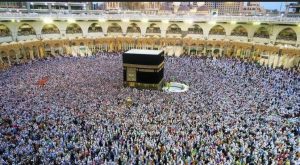MAKKAH: THE SACRED CITY AND ITS ENDURING LEGACY
The History and Significance of Makkah: The Sacred City

History provides us with a record of past events, but distinguishing between fact and fiction is a responsibility for every Muslim. Islam encourages the pursuit of truth, urging believers to seek authentic and reliable sources when learning about historical events—especially when it comes to the sacred city of Makkah.
Makkah: The Holiest City on Earth
Makkah holds an unparalleled status in Islam as the most sacred and revered city. The most authoritative sources of its history are the Qur’an and authentic prophetic narrations, which provide insight into its origins, development, and significance before and after the prophethood of Muhammad (peace be upon him).
Muslim scholars and historians have meticulously chronicled Makkah’s history. Some of the earliest dedicated works include:
•“Chronicles of Makkah and Its Ancient Monuments” by Abu Al-Waleed Al-Azraqi (3rd century AH)•“Chronicles of Makkah in Ancient and Contemporary Times” by Al-Fakihi (3rd century AH)
After a period of historical silence, Imam Taqiyyud-Deen Al-Fasi Al-Makki (775–832 AH) reignited scholarly interest by authoring several detailed accounts, including “The Therapy for Those Who Harbour Affection for the History of the Sacred City” and “The Treasured Necklace on the History of the Secure City.”
Later, historical documentation of Makkah continued through various scholars and families such as Aal Fahd and Aal At-Tabari, extending into modern times.
The Establishment of Makkah
The history of Makkah is deeply tied to Prophet Ibrahim (Abraham, peace be upon him), who first settled his family there in obedience to Allah’s command. Ibn Abbas (may Allah be pleased with him) narrated that Ibrahim brought his wife Hajar and infant son Isma’il (Ishmael, peace be upon him) from ancient Syria to Makkah, a barren valley with no water or inhabitants at the time.
As he departed, Hajar asked:
“Did Allah command you to do this?”
Ibrahim replied: “Yes.”
She responded with unwavering faith: “Then He shall never forsake us.”
After Ibrahim left, Hajar searched desperately for water, running between the hills of Safa and Marwa. In response to her devotion, Allah miraculously provided the Well of Zamzam, ensuring survival and attracting people to settle in Makkah. The first tribe to do so was Jurhum, from whom Isma’il later married.
Ibrahim returned to Makkah repeatedly, and eventually, Allah commanded him to build the Ka’bah with Isma’il. Allah says in the Qur’an:
“And [mention] when Ibrahim was raising the foundations of the House and [with him] Isma’il, [saying]: ‘Our Lord! Accept [this] from us. Indeed, You are the Hearing, the Knowing.’” (Qur’an 2:127)
Ibn Kathir, in his famous historical work “The Beginning and the End,” confirms that Ibrahim was the first to build the Ka’bah. In a narration from Abu Dharr (may Allah be pleased with him), the Prophet Muhammad (peace be upon him) clarified:
•The Sacred Mosque in Makkah was the first mosque built on Earth.
•The Al-Aqsa Mosque in Jerusalem was built 40 years later.
(Reported in Sahih Al-Bukhari)
Thus, the Ka’bah was the first structure established in Makkah, followed by the Well of Zamzam, which became a vital source for its inhabitants and visitors.
The Decline into Idol Worship
For generations, the descendants of Isma’il upheld the monotheism of Ibrahim. However, ‘Amr bin Luhay Al-Khuza’i, a leader of the Khuza’ah tribe, introduced idol worship to Makkah, claiming it was practiced by more “advanced” civilizations. Over time, idolatry spread, and the Ka’bah became a center for polytheism, housing 360 idols.
Restoration of Makkah’s Sanctity
With time, the Quraysh tribe, led by Qusay bin Kilab (a forefather of Prophet Muhammad), reclaimed control over Makkah. He restored its sanctity and centralized its governance, ensuring pilgrims were provided with food and water.
During this era, the Well of Zamzam was buried due to conflicts but was later rediscovered by Abdul-Muttalib, the grandfather of Prophet Muhammad, after seeing a dream that guided him to its location.
The Year of the Elephant
A significant event in Makkah’s history was Abrahah’s attempt to destroy the Ka’bah. Abrahah, a ruler from Ethiopia, led an army with a mighty elephant, but Allah miraculously destroyed them with flocks of birds that pelted them with stones of baked clay. This event, recorded in Surah Al-Fil (The Elephant), occurred in the year 570 CE, the very year Prophet Muhammad (peace be upon him) was born.
Makkah: A City of Timeless Significance
Makkah’s profound history and its spiritual status make it the holiest city in Islam. It remains a place of pilgrimage, devotion, and unity for Muslims worldwide.
As the birthplace of Islam, the site of the Ka’bah, and the destination of Hajj and Umrah, Makkah holds a sacred place in the hearts of all Muslims—a city that continues to be honored and revered as a center of monotheism, just as Prophet Ibrahim (peace be upon him) intended.

